Politics
Trump escalates crackdown threats with Chicago ‘war’ warning
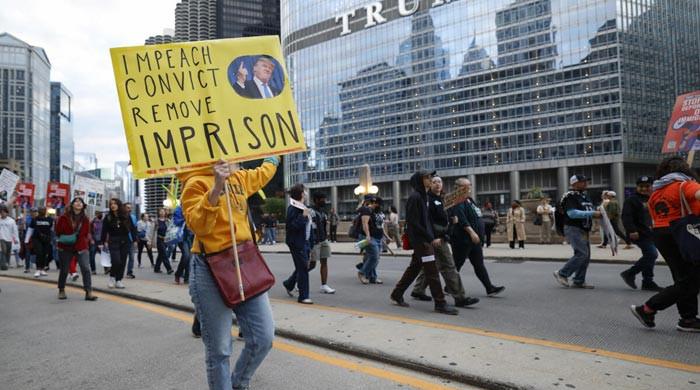
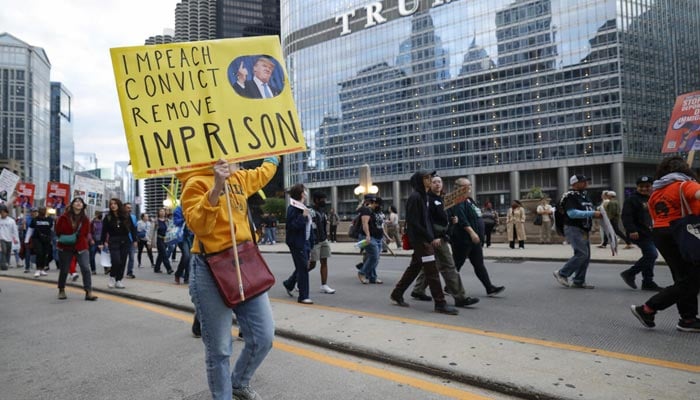
- Protesters march in Chicago against troops’ deployment.
- Governor Pritzker slams Trump’s threat against Chicago.
- “This is not a joke,” says Pritzker in social media post.
President Donald Trump has threatened to unleash his newly rebranded “Department of War” on Chicago, further heightening tensions over his push to deploy troops into Democratic-led US cities.
The move seeks to replicate an operation in the US capital, Washington, where Trump deployed National Guard troops and boosted the number of federal agents, sparking a backlash and a fresh protest on Saturday that drew thousands.
“Chicago is about to find out why it’s called the Department of WAR,” Trump posted Saturday on his Truth Social account.
The Democratic governor of Illinois, where Chicago is located, voiced outrage at Trump’s post.
“The President of the US is threatening to go to war with an American city. This is not a joke. This is not normal,” Governor JB Pritzker wrote in a post on X.
“Illinois won’t be intimidated by a wannabe dictator,” he added.
The post featured an apparent AI image of Trump and the quote: “I love the smell of deportations in the morning” — both references to the 1979 Vietnam War film “Apocalypse Now”.
In the film, the line is spoken by Lt Col Bill Kilgore who says he loves the smell of “napalm” — not “deportations” — as the American military drops the highly flammable weapon on Vietnamese targets.
The 79-year-old Republican has steadily ramped up threats against Chicago since an early mention of it at the end of August.
Anti-Trump protesters took to the streets of Chicago on Saturday, carrying signs that read “stop this fascist regime!” and “no Trump, no troops.”
The protest route also went past Chicago’s Trump tower, and protesters made rude gestures at the president´s building as they walked past.
On Saturday in the US capital, where National Guard troops have been deployed since Trump declared a “crime emergency” in August, a thousands-strong protest march wound through downtown with participants demanding an end to the “occupation.”
Demonstrators in DC carried inverted US flags as they marched past the country´s national monuments, traditionally a symbol of a country facing existential peril.
Trump´s troop and federal agent deployments — which first began in June in Los Angeles, followed by Washington — have prompted legal challenges and protests, with critics calling them an authoritarian show of force.
Local officials in Los Angeles spoke out against the deployments and the violent tactics employed by ICE agents in Los Angeles, who often wore masks, drove in unmarked cars and chased down and snatched people from the streets without cause or warrants.
In addition to Chicago, Trump has threatened to replicate the surges in Democratic-led Baltimore and New Orleans.
On Friday, Trump signed an order changing the name of the Department of Defence to the Department of War, saying it sends “a message of victory” to the world.
Pentagon chief Pete Hegseth cheered the move, saying the US will decisively exact violence to reach its aims, without apology.
Politics
Row deepens over vanished river wave in Munich
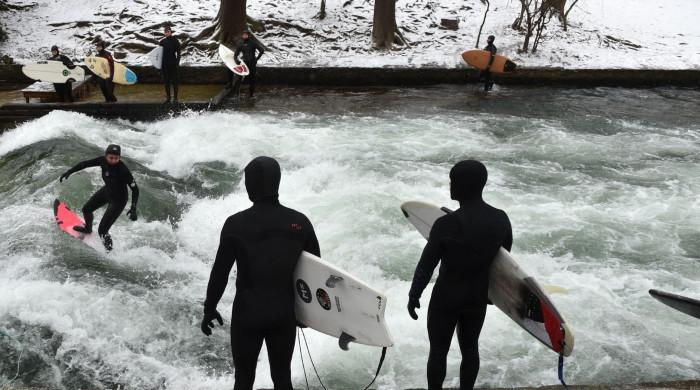
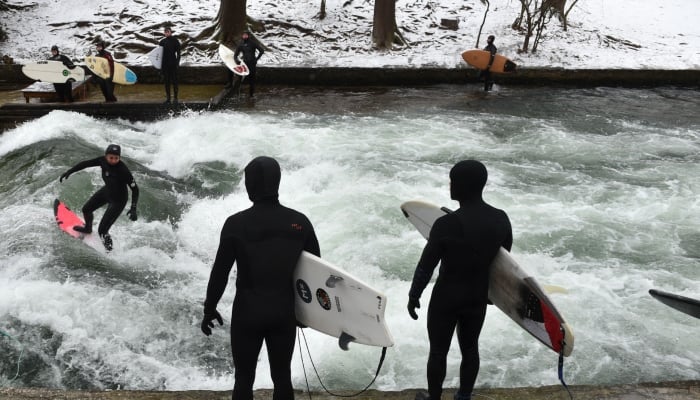
A row over the disappearance of a famous river surfing wave in Munich escalated on Sunday as authorities removed a beam inserted over Christmas to recreate the attraction.
The Eisbach wave on a side branch of the Isar River had been a landmark in the Bavarian city since the 1980s but it vanished in October after annual cleanup work along the riverbed.
Activists had placed a beam in the water early on December 25 to partially recreate the wave, according to German media reports, and hung a banner above the water that read “Merry Christmas”.
But a spokesman for the Munich fire service told AFP the “installation was removed” on Sunday at the request of city authorities.
Activists have made several attempts to reinstate the wave in the city’s Englischer Garten park since October — only to see them reversed.
The local surfers’ association IGSM on Thursday posted a statement on its website saying it had abandoned its campaign to save the wave, accusing city authorities of dragging their feet.
The Eisbach wave was considered the largest and most consistent river wave in the heart of a major city and had become a tourist attraction in Bavaria’s state capital.
Franz Fasel, head of the IGSM, told AFP in July that 3,000 to 5,000 local surfers were using it.
Access to the wave was cut off for several months earlier this year after the death of a 33-year-old Munich woman who became trapped under the surface while surfing at night.
Politics
Bangladesh police say student leader Osman Hadi’s killers fled to India
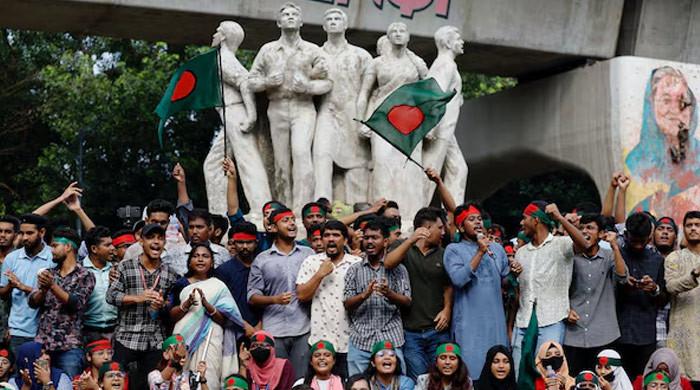
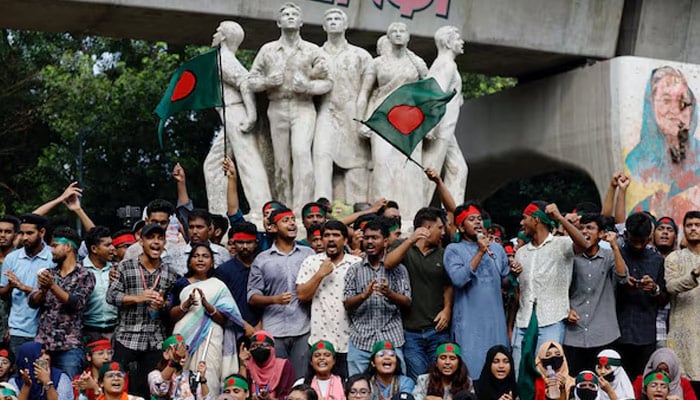
- Police identify suspects in Sharif Osman Hadi murder case.
- Bangladesh seeks cooperation from India over Hadi killing.
- Protests intensify in Bangladesh after student leader’s death.
DHAKA: Bangladesh police on Sunday said the alleged killers of popular student leader Sharif Osman Hadi had fled to India, in comments likely to further strain relations with its neighbour.
Hadi, a vocal Indian critic who took part in last year’s mass uprising, was shot by masked assailants in Dhaka earlier this month and later succumbed to his injuries at a hospital in Singapore.
His death set off violent protests with angry mobs torching several buildings, including two major newspapers deemed to favour India, as well as a prominent cultural institution.
With protests being held across the country almost daily, pressure has been growing on Bangladesh’s interim government to arrest the killers of Hadi, who was set to contest the general elections in February next year.
“The killing was premeditated. Those behind it have been identified,” SN Nazrul Islam, a senior Dhaka Metropolitan Police officer, said at a news conference.
Suspects Faisal Karim Masud and Alamgir Sheikh left Bangladesh through the Haluaghat border with India shortly after attacking Hadi on December 12, Islam said.
They were received at the border by two Indian citizens, who escorted them into the northeastern state of Meghalaya before handing them over to two accomplices.
Bangladeshi investigators were in contact with their Indian counterparts who had arrested the two suspected accomplices, Islam said.
“We are communicating with Meghalaya police, who have confirmed the arrest of two Indian nationals,” he added.
Two senior Meghalaya police officers, however, did not comment when contacted by AFP.
The Indian foreign ministry had earlier said it rejects “false narratives” about New Delhi´s involvement in Hadi´s killing.
Ties between the neighbours have deteriorated since the ousted prime minister, Sheikh Hasina, fled the pro-democracy uprising and sought refuge in India.
India says it is still considering Dhaka’s requests to extradite Hasina, who was sentenced to death in absentia for orchestrating a deadly crackdown on the uprising.
The lynching of a Hindu garment worker by a mob on December 18 has also hit ties.
Amid the deteriorating security situation in the Muslim-majority country, Khuda Baksh Chowdhury, special assistant to interim leader Muhammad Yunus, overseeing the home department, stepped down on Wednesday.
Politics
Sikh activists clash with BJP supporters outside Bangladesh Embassy in London
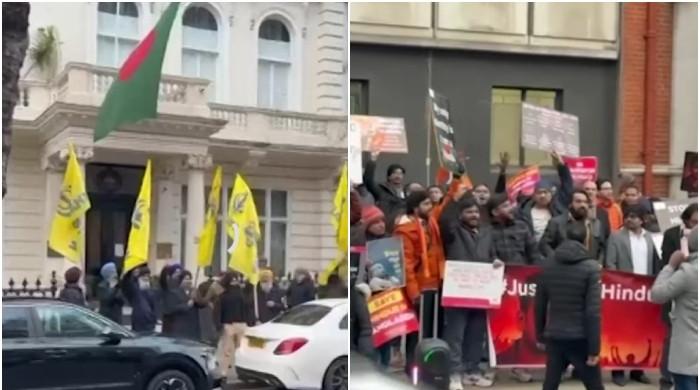
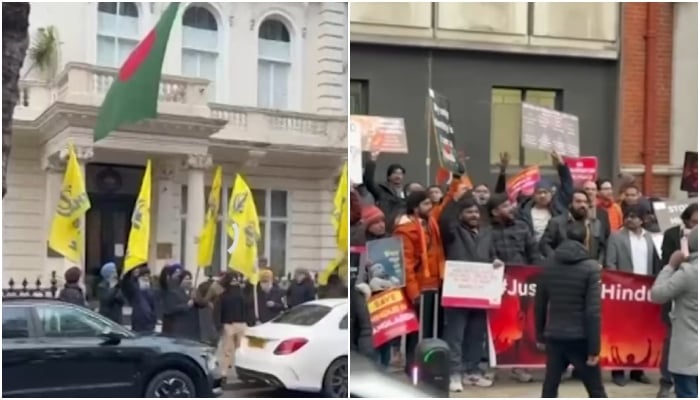
- Hindu groups’ protest met with pro-Khalistan activists.
- Police addresses scuffle, intervenes and restores order.
- India persecuting Sikhs, Muslims, Christians: Sikh leader.
LONDON: Tensions flared outside the Bangladesh Embassy as a confrontation broke out between Pro-Khalistan Sikh activists from Sikhs For Justice (SFJ) and a group of British Indian Hindu groups aligned with India’s ruling Bhartiya Janata Party (BJP) during a demonstration related to the alleged killings of Hindus in Bangladesh.
The protest, which sought to stand in solidarity with minorities, was met with anti-India slogans from the Khalistani group, which also raised Khalistani flags.
Veteran Khalistani activist Paramjeet Singh Pamma, a coordinator of the Khalistan Referendum campaign, confronted the Hindu protest group gathered outside the embassy premises.
A scuffle occurred between Pamma and the BJP’s Hindutva supporters, prompting swift intervention by Metropolitan Police officers stationed at the scene who separated the two groups and restored order.
Pro-Khalistan Sikh activists formed a protective presence around the embassy building. Demonstrators raised slogans accusing the Indian government of responsibility for deaths linked to Sikh activists, including chants of, “who Killed Hadi — Modi”, and “who killed [Hardeep Singh] Nijjar — Modi, Modi, India”.
Pamma is designated by India as a “most wanted terrorist,” a label applied by Indian security agencies to several Khalistan-linked figures. However, the legal status of Pamma in the UK differs from India’s position.
Expressing his views on Indian allegations, the Sikh leader said, “I reside openly in the United Kingdom; no UK court has convicted me of terrorism-related offences; no extradition request by India has resulted in my removal, and UK authorities have not legally upheld India’s allegations against me.
“We gathered here today to expose India’s dirty face. India is involved in persecuting Sikhs, Muslims and Christians at home; it cannot blame Bangladesh for human rights violations. We are focused on the next phase of the Khalistan Referendum, which will reveal the full scale of atrocities committed by India against the Sikhs,” remarked Pamma.
The clash comes as ties between New Delhi and Dhaka have been strained since the ouster of former prime minister Sheikh Hasina, who currently resides in India. The bilateral relations further took a dive following the killing of Bangladesh student leader Sharif Osman Hadi and the lynching of a Hindu worker in Bangladeshi capital.
-
Sports1 week ago
Alabama turned Oklahoma’s College Football Playoff dream into a nightmare
-

 Entertainment1 week ago
Entertainment1 week agoRare look inside the secret LEGO Museum reveals the system behind a toy giant’s remarkable longevity
-

 Business1 week ago
Business1 week agoGold prices in Pakistan Today – December 20, 2025 | The Express Tribune
-
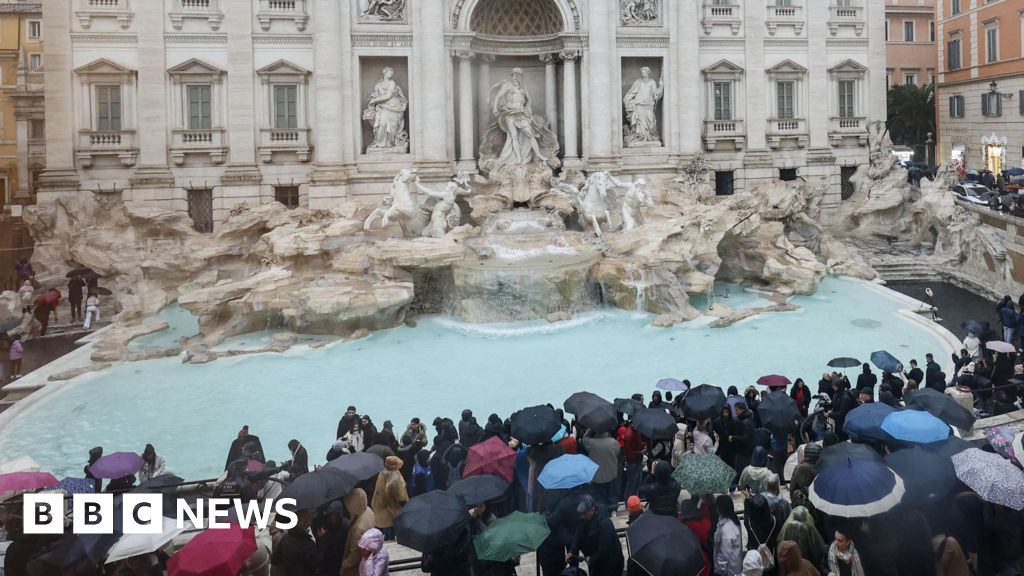
 Business1 week ago
Business1 week agoRome: Tourists to face €2 fee to get near Trevi Fountain
-

 Entertainment1 week ago
Entertainment1 week agoIndia drops Shubman Gill from T20 World Cup squad
-

 Entertainment1 week ago
Entertainment1 week agoZoe Kravitz teases fans with ring in wedding finger
-

 Tech1 week ago
Tech1 week agoWe Tried and Tested the Best Gifts for Plant Lovers With Our Own Green Thumbs
-
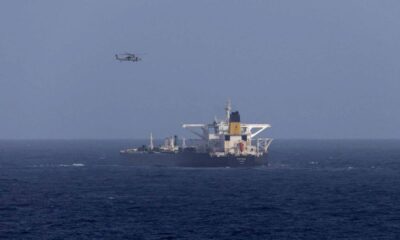
 Politics1 week ago
Politics1 week agoUS intercepts oil tanker off Venezuelan coast, Reports






